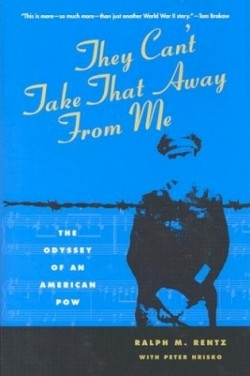They Can't Take That Away From Me
The Odyssey of an American POW
The author tells a harrowing story of being held in several Japanese prison camps in Java for three years and seven months during World War II. Rentz was the chief radio operator aboard a B-17 bomber when it was shot down by Japanese fighter planes. The crash left him near death, with shrapnel in his right shoulder and right leg. A Dutch doctor, also a POW, operated on Rentz to remove the steel from his body. Later Rentz was transferred to a second camp where another Dutch POW, a physical therapist, helped him to walk again, despite the constant spasms of pain.
Rentz describes his life as a prisoner: how he and other POWs stole duck eggshells and stinking fish from garbage pails to supplement their meager diet of rice; illness such as dysentery; beatings inflicted by guards; and threats of death by shooting and beheading. At one point, Rentz writes, POWs were made to cut seaweed underwater. Some prisoners became entangled and drowned. He also recounts how he worked cleaning the barracks of Japanese officers, where he stole soap and exchanged it for fruit, cucumbers, snake meat, and peppers. “Business was thriving,” he writes. After one beating, Rentz became mentally deranged and fought with the guards, not caring if they killed him.
Interspersed with these scenes of despair are flashbacks to his young life in Lansdowne, Pennsylvania, where, as an eight-year-old Jew, he got lessons in self-defense from a family friend, which enabled him to whip the anti-Semitic bully who was picking on him. Rentz also writes of life in the 1930s when he worked as a musician with the Steel Pier Band in Atlantic City. The book’s title and forty-one chapter headings are named for some of the famous tunes of that big-band era.
In a poignant scene when the author was recuperating in a New York hospital after he had been freed by Allied troops, his parents visited him. He had lost eighty-five pounds and all his hair; they momentarily refused to accept the fact that this young man was their son.
Co-writer Hrisko is the author of Peter Rock, a children’s book. Rentz is now eighty-five, retired, and on 100 percent disability. The nightmares still haunt him, “but I’m glad to be alive,” he writes. His memoir vividly captures the horrors of the POW camps with piercing honesty.
Reviewed by
George Cohen
Disclosure: This article is not an endorsement, but a review. The publisher of this book provided free copies of the book to have their book reviewed by a professional reviewer. No fee was paid by the publisher for this review. Foreword Reviews only recommends books that we love. Foreword Magazine, Inc. is disclosing this in accordance with the Federal Trade Commission’s 16 CFR, Part 255.

